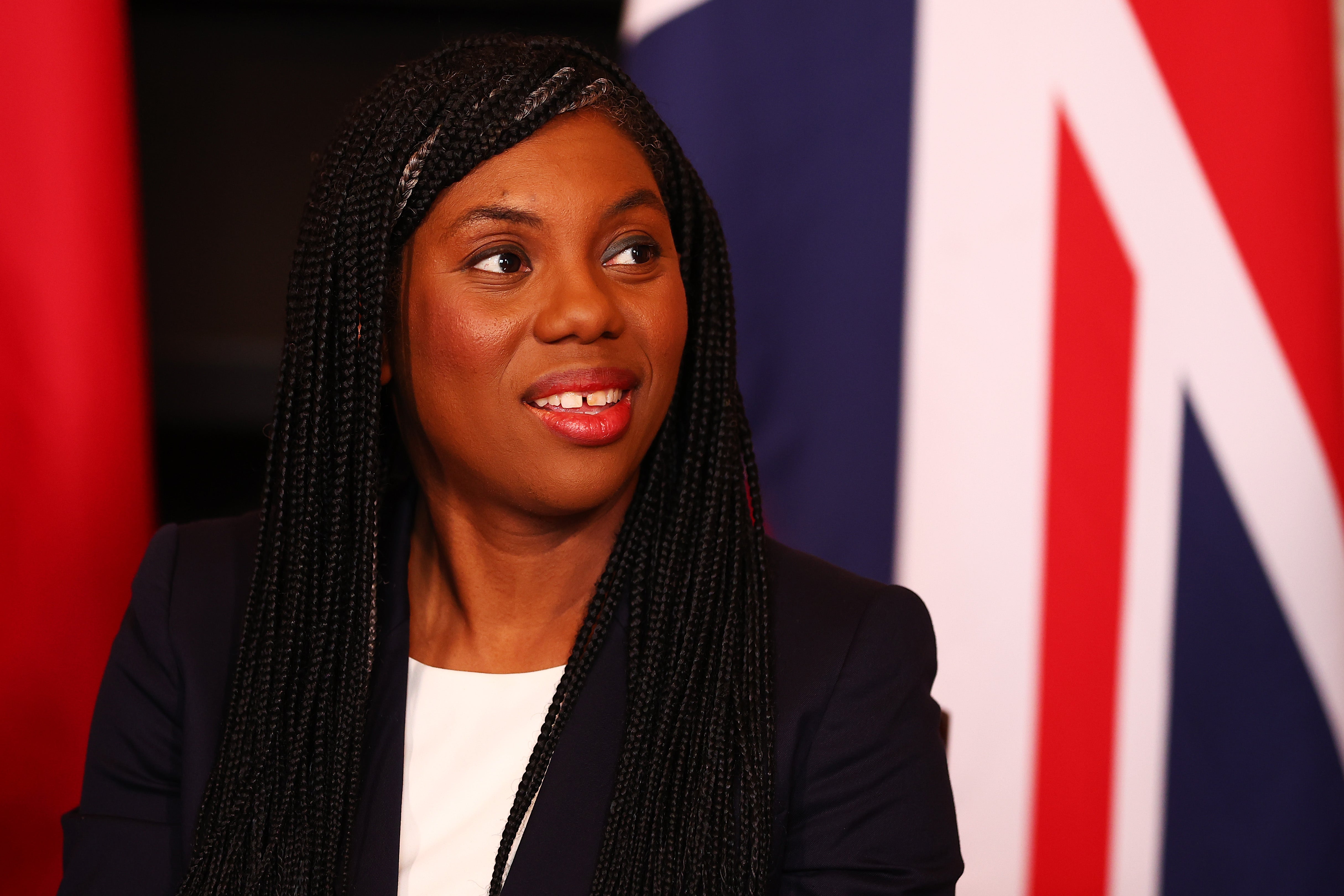Kemi Badenoch: The battling Boudica who isn’t who you think she is
She’s known for her tough exterior, but those who know her tell Jane Preston this hides a thin and prickly skin, which makes her prone to political fallouts and spats with friends – even when they are trying to help her

Kemi Badenoch is the woman who always wanted to wear Margaret Thatcher’s “trousers”. As a child growing up in Nigeria’s patriarchal society, she saw Thatcher as her heroine; a self-made woman of power who was outspoken and uncompromising in her conviction.
“Whenever I was told I couldn’t do something because I was a girl, I would just say two words: Margaret Thatcher. And there was nothing they could say in response to that” says Badenoch. “She was inspirational.” Unbeknown at the time, the young Nigerian schoolgirl would not only go on to sit at the cabinet table where Thatcher ran Britain for over 11 years but would, today, be in the final moments of a battle to become the next leader of the Conservative and Unionist party.
The Tory party has been looking for a new Margaret Thatcher since they got rid of the last one. The hopes that Theresa May and Liz Truss would fit the bill came to nothing, but in Badenoch, they see a woman who, like Thatcher, is a leader who is willing to say what other politicians won’t.
Badenoch is especially loved by the Tory grassroots for being an outspoken and trenchant critic of “wokery, critical race theory and gender identity ideology”. Those who support her politically want a culture war warrior. They need someone who is not going to compromise.
And Badenoch doesn’t compromise with anyone about anything. It is a trait that has made her unpopular with many of her peers. She’s earned a reputation for a combative and abrasive style of politics, with claims she is rude, arrogant and aggressive. “Her instincts are to go straight for the jugular,” says a Westminster insider. “And she is completely unapologetic for doing so.”
So what has made Badenoch the battling Boudica of the Conservative Party? In many ways her formative years in Nigeria moulded her into the woman and politician she is today.
Olukemi Olufunto Adegoke was born in St Teresa’s Hospital, London, in January 1980 after her parents travelled to Britain and paid for private healthcare at a maternity hospital, giving her the rights to a British passport. The family returned to Nigeria where her father worked as a GP and her mother a professor of physiology.
In one of her first speeches as an MP, Badenoch spoke of “living without electricity and doing my homework by candlelight, because the state electricity board could not provide power, and fetching water in heavy, rusty buckets from a borehole a mile away, because the nationalised water company could not get water out of the taps”. A precocious child, she excelled at English and won a national girls chess championship when she was just seven years old.
Badenoch’s parents instilled strict traditional Christian values (her grandfather was a Methodist minister) and the belief she could achieve anything she put her mind to. Earlier this year, she told one interviewer how her friends would see them like the Cosbys, because unlike some strict Nigerian parents, hers was a warm household where they would all joke and laugh. She was encouraged to voice her opinion. “Kemi was always outspoken,” says a school friend. “If there was something she didn’t agree with, she would respectfully tell the teacher. I think her parents instilled a certain amount of confidence in her.”

When she was 14, her British passport arrived. “I remember the day,” Badenoch has recalled. “It was like in Charlie and the Chocolate Factory, when you open the chocolate bar and there’s the golden ticket. It was amazing.” It provided her with the opportunity two years later to leave her family behind in Lagos and move to London to study A Levels.
Her parents had hoped she would follow them into medicine. But her A level results (B in biology, B in chemistry and D in maths) precluded a medical career and she enrolled at Sussex University on a computer systems engineering course. It was while at Sussex that her political awakening really took hold.
She loathed the liberal student culture, and the “privileged lefty white kids” protesting against the introduction of tuition fees. In a signed letter to the student newspaper, she wrote that no student had a right to expect the taxpayers to cover the cost of their education.
It was the first public expression of her Conservative and contrarian thinking. Fellow students called her out because she was in receipt of a grant from the London Borough of Merton that covered her university costs. The young Badenoch was further angered by student support for Bob Geldof’s Live 8 concerts, saying she felt it condescending that wealthy Western musicians had taken it upon themselves to speak on behalf of African people and tell world leaders what Africa needed.
The experiences moved Badenoch, aged 25, to join the Conservative party. “The reason I went into politics was because I was angry,” she told one interviewer. “I was a very angry young person. Angry about so much stuff. And the two things that really, really got my goat were education and international development. In joining the party, I felt I had found my second family.”

Once out of university, Badenoch began working as a computer systems analyst before moving to Coutts bank as a wealth manager. When she bought her first flat in Brixton from the Family Mosaic housing association, she joined the local Dulwich and West Norwood Conservative Association. She was selected as their parliamentary candidate for the 2010 general election.
It was on the campaign trail that she met local activist Hamish Badenoch, a Cambridge-educated banker who’d been head boy at Ampleforth. Despite him being a One Nation Remainer and her a staunch Brexiteer, they struck up a friendship which developed into a relationship.
It was decided he would become her campaign manager. But there was some friction from the start: “She was prone to turning up 45 minutes late to meetings, complaining and picking fights. She wouldn’t apologise, she would glare,” says Andrew Gibson, a Tory councillor at the time. He calls Badenoch “an ingrate” who “sometimes treated people like servants”.
After losing the election she married Hamish and changed jobs, working for The Spectator as head of digital operations. It brought her into the orbit of influential Conservative figures who, impressed by her convictions, championed her progress to the safe Essex seat of Saffron Walden.
She won the seat in the June 2017 election and signed into the House of Commons as a new backbench MP, carrying her second baby in a sling. Today, they live with their three children – the youngest is 5 – in a 16-century house at the end of single-track road. A picture of country living that is completed with the wellies displayed outside and the Aga found inside.
While people closest to her are totally on board with her strength of opinion and directness, those outside her inner circle say her ‘tough’ exterior is masking a thin and prickly skin
Within seven months of being elected an MP, she was appointed vice-chair. By now she’d come to the attention of party heavyweight Michael Gove who acted as her mentor and was pushing her to the fore of the party, even announcing at a party dinner: “Kemi Badenoch will be the next leader of the Conservative party.”
Gove’s “puppet master” activities concerned parliamentary peers who were starting to view Badenoch’s outspokenness as a potential liability for making too many enemies.
She’s been embroiled in a very public row with Doctor Who actor David Tennant who told her to “shut up” over trans rights issues. And she got into spats with anti-racists, race equality think tank members over her views on race. As equalities minister in Rishi Sunak’s government, she faced down a stormy Commons committee session by defending the government’s move to reject a cross-party call for help for women through menopause.
Criticism of her sometimes pugnacious manner follows a theme that plays throughout Badenoch’s political career. While she was secretary of state for the Department for Business and Trade she was accused of “traumatising” civil service staff with her “mercurial moods and intimidating behaviour”, which saw three senior officials leave the department.
Witnesses claim that one individual had become so affected by the “sustained bullying” that they began stammering in Badenoch’s presence. She denied the allegations, claiming they were “utterly false and politically motivated”.
Allies say, in her defence, that she doesn’t suffer fools gladly. But detractors say she bears a long grudge against her critics, citing her comments at the Conservative party conference in Birmingham where she said up to 10 per cent of civil servants are “very, very bad” and “should be in prison”.
Her comments, reiterated on X, were met with anger from the PCS, the civil service’s largest union. “Kemi Badenoch just can’t let it lie, can she? When she was in power she was accused of bullying civil servants. Now she’s out of power she’s continuing her personal feud against them.”

“She’s got this Nigerian approach to conflict resolution. That’s stayed with her,” says a friend. “She will leap in. To Kemi, this is all about combat.” Other Westminster watchers say she is equipped with a rare gift among politicians: “She just doesn’t care what other people think of her. For Kemi, hate is an affirmation of the rightness of her cause. She almost feeds off the hate. It’s like a life-giving force.”
But many say her main problem is her inability to form lasting working relationships. During the last election, she had barely any support from local constituents in Saffron Walden. The party couldn’t persuade anyone locally to go out and campaign for her and had to bring in outsiders.
Insiders say relations have cooled with her mentor, Gove, with no sign of any rift healing soon. He has been notably absent during her Tory leadership campaign and she allegedly recoils at any mention of him. The embers are still warm from Badenoch’s spectacular falling out with fellow MP Suella Braverman whom she reportedly accused of having a “very public” nervous breakdown.
While people closest to her are totally on board with her strength of opinion and directness, those outside her inner circle say her “tough” exterior is masking a thin and prickly skin. “She is impossible to work with,” says a fellow MP. “You can’t have someone in charge who falls out with everyone over the smallest of things.”
So is Badenoch really ready to wear Margaret Thatcher’s crown? Smart, determined, and willing to say controversial things that she passionately believes in for sure. But she will need to grow in character to build alliances which are needed to a successful and not endlessly divisive leader.
An outsider who becomes an insider will always do things differently, but perhaps an observation made recently by a sitting MP should serve as a warning: “Margaret Thatcher took the same confrontational approach that Kemi is taking. And Margaret had similar problematic relationships. It ultimately caused her downfall.”
Subscribe to Independent Premium to bookmark this article
Want to bookmark your favourite articles and stories to read or reference later? Start your Independent Premium subscription today.





Join our commenting forum
Join thought-provoking conversations, follow other Independent readers and see their replies
Comments